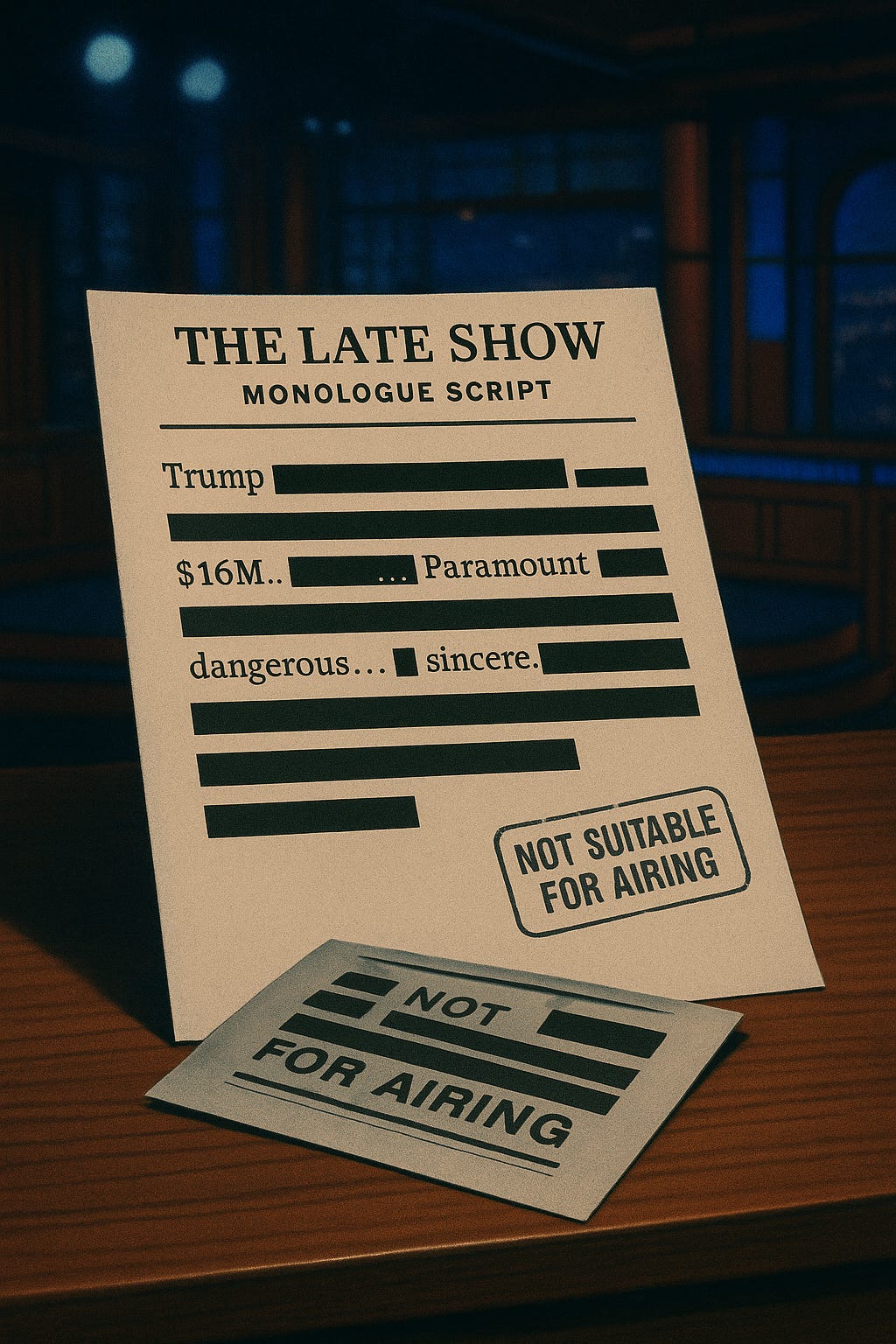Why Colbert Had to Go
Truth, satire, and the terrifying obedience of corporate media in the age of Trump.
The first time America killed a comedian for telling the truth, it took a courtroom. The second time, it only took a boardroom.
Before Stephen Colbert, there was Lenny Bruce. In the 1960s, Bruce was arrested, blacklisted, and banned from venues, not for inciting violence, but for speaking uncomfortable truths laced in profanity and satire. His jokes about religion, race, politics, and police corruption were too honest for the system to tolerate. He died broke and silenced. Decades later, he was posthumously pardoned. Too late to matter.
Act 1: The Martyr Stephen Colbert made a joke. Not his most scathing, not his funniest. But it hit where it hurt: a $16 million settlement between Trump and Paramount, CBS’s parent company, described on air as a “big fat bribe.” Three days later, The Late Show was cancelled. Trump crowed. Media execs vanished into polite silence. The timing was precise. The message is unmistakable. In a post-truth democracy, the joke wasn’t dangerous because it was untrue. It was dangerous because it was sincere.
Act 2: The Mechanism This wasn’t classic fascism. No jackboots. No state censor. No official blacklist. Just a CEO signing a termination memo with one hand and a campaign donation with the other. A quiet phone call, a nervous boardroom, and a risk-averse decision. That’s how authoritarianism functions in 2025 America, not through brute force, but through corporate obedience. When power is centralised, truth becomes a liability. And the tools of suppression wear suits. The result is the same: less space for dissent, fewer voices allowed to speak freely, and a laugh track played over a closing noose.
Act 3: The Chilling Effect Late-night comedy isn’t just background noise. It’s one of the few mainstream spaces where power is still mocked with reach, where satire still carries consequence. These shows are cultural pressure valves, shaping how millions interpret the absurdity of power. To cancel Colbert is to send a message: even that space is no longer safe. The goal isn’t just to control what’s said, it’s to control what can even be imagined. In regimes that fear creativity, laughter isn’t entertainment. It’s resistance.
Then came the next line in the script: Trump publicly calling for Jimmy Kimmel to be next. Not as a joke, but as a threat. It wasn’t subtle. This is where authoritarianism begins to morph. When critics are removed not for ratings but for disobedience, and when those in power cheer their fall, we begin to hear the fascist whispers. Not yet full-throated. But audible. And growing.
Oscar Wilde warned us with velvet gloves:
“A little sincerity is a dangerous thing, and a great deal of it is absolutely fatal.”
Colbert wasn’t cancelled for a segment. He was cancelled for sincerity, for mocking power without flinching, for refusing to participate in polite complicity. This is the new culture war: not left vs right, but truth vs obedience. And in that war, satire may be the first casualty, but it will not be the last.
The Killshot: Much ink has been spilt about cancel culture, students, social media mobs, the fear of saying the wrong thing. But Colbert’s cancellation reveals something more insidious. The most effective cancellation isn’t noisy. It doesn’t trend. It doesn’t demand an apology. It comes from boardrooms, from settlements, from shareholder risk assessments. A critic of power made one joke too many. A financial trail to the president was questioned, on live television, in public, and on national airwaves. And three days later, he was gone. This is how dissent dies now: not with a riot, but with a quarterly earnings report. Not with a scream, but with a severance package. And when the next comedian steps up to the mic, they’ll remember not what happened to Lenny Bruce, but what happened to Colbert. The joke will still be written. It just won’t be said.




